The 10 Different Blogger Personality and Writing Types

Blogging is blogging, right? It's all about creating content that your audience wants to see. More importantly, you have to blog in a way that gets past the censors and filters at Google. If your content isn't being served to new visitors, it isn't doing you a lot of good. So what makes two separate blogs in the same niche, with similar high-quality content, attractive to different people?
The truth is, there's another aspect to blog writing that isn't talked about nearly as often: the author's personality. This personality is much more visible in other content creators, but it's still present in content marketing.
Different types of blogs have various writing styles and perspectives from the authors, and sometimes people are naturally more attracted to one kind over another. Defining and following your blogger persona is a big part of thought leadership, personal branding, and online success.
As it turns out, you can boil down the various types of bloggers and personalities into about ten different groups. I've seen a few other lists and a few different perspectives on some of these. If you have a different idea, let me know in the comments!
With that said, here is what I've found in my browsing.
1: The Explainer
I would venture to say that this first category is what most successful bloggers fall into. At least, a majority of successful blogs. I fall into this category as well.
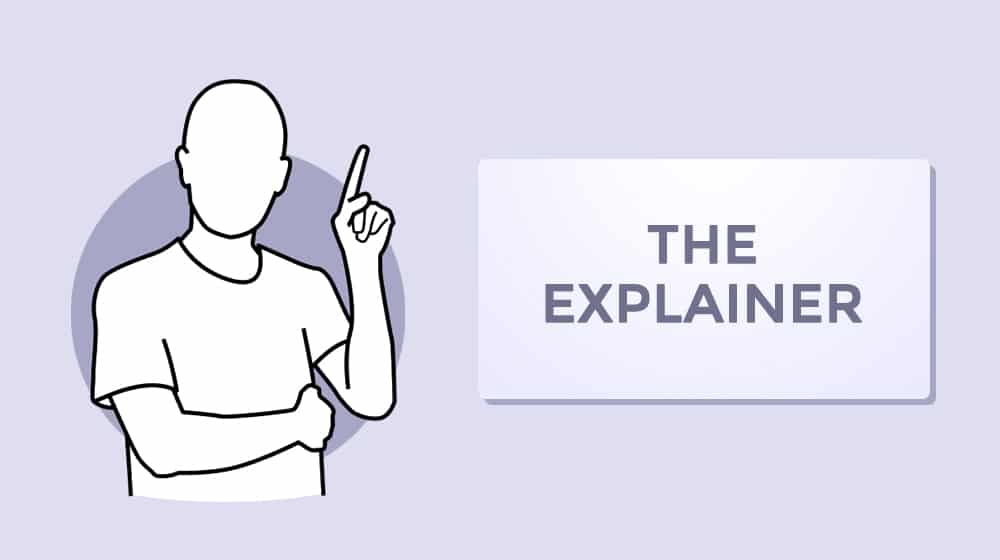
We're the bloggers who love to educate people. We pride ourselves in our ability to take a significant, specific topic and break it down into a variety of different smaller topics, explaining each one of them in a compelling and easy-to-understand way.
Our audience visits our sites because we're a good resource. We teach the people who want to learn. We explain subject matters that need and deserve an explanation. We provide resources to help people with their lives, careers, and hobbies. Explainers can cover anything from basic beginner's guides and step-by-step guides, podcasts, and even infographics.
We're also one of the easiest personas to adopt. As long as you can explain a topic and put some hard work into your blog content, you can be an explainer after your first blog post. We build authority over time by creating a library of evergreen content on our niche of choice and winning the race slowly and steadily.
2: The Narrator
The narrator (also known as the storyteller) is the blogger who couches everything in anecdotes and stories.
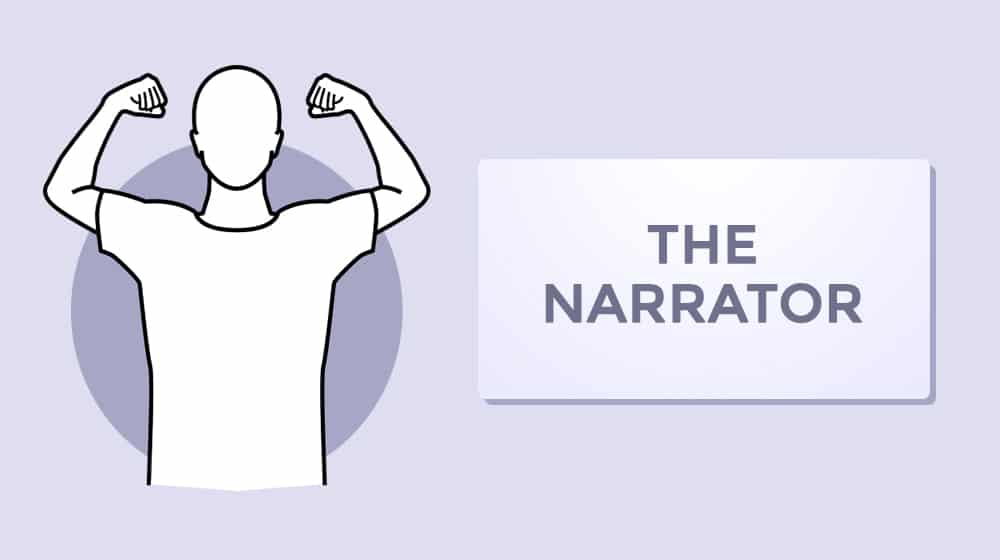
The most common example of this tends to be things like food blogs, travel blogs, and lifestyle bloggers. For example, these are the people who write about their experiences traveling. Or, they are writers that share how some aspect of their life ties into the recipe they're going to make for you. It's as much about the story as it is about the recipe.
Many people don't care for storytellers. They'll visit any site that has one and doesn't care about the story. It's so common that there's even a joke about food blogs having half a novel before they even introduce the recipe. Many people are just looking for the recipe.
People, in general, don't tend to follow information. They follow personalities. But, storytellers can become some of the most engaged and interactive bloggers out there. A compelling enough storyteller attracts a target audience solely dedicated to following their lives.
This phenomenon doesn't always sync up well with business. These narrator or storyteller bloggers survive by monetizing their WordPress blog through affiliate marketing, storefronts, merch, or just simple donations through Patreon. Unfortunately, it's much less plausible to run a new blog like this for a company or business. Companies need to focus on content that addresses their customer pain points, so this type of content isn't the best fit for their customer base.
3: The Journalist
The journalist or reporter takes a question and runs with it.

Contrary to what you might think, a journalist isn't a news publisher. They might pick up a trending topic and dig into it, but they aren't there to publish a post about today's newest headline. Instead, they dig deeper into it. We're talking old-school investigative journalism here.
There's usually a big piece of content going viral in this format every month or so. Publications like Vice, Motherboard, Mother Jones, ProPublica, and others are common sites publishing these posts.
These authors dig deeper than everyone else. They ask questions you might not think need to be asked or even realize that writers can talk about them openly. They're the people who dig into topics and reveal secrets you'd be shocked to hear, at least out in the open. The work these people do can make or break companies or entire industries.
The trick is, it's a lot of work to make this kind of content, and it's not lucrative to do so. In some cases, it's even hazardous. Sure, a journalist might not be in danger for digging into the deep secrets of how a search engine's algorithm works, but if they dig too deep into Nestle's dealings with child exploitation, well, that's another story.
These people are essential, but the barrier to entry is extremely high, and the reward is often minimal for their work. They are, sadly, less common than ever.
4: The Confessor
The Confessor "tells the truth" in an industry that is riddled with lies. Or, at least, so they present themselves.
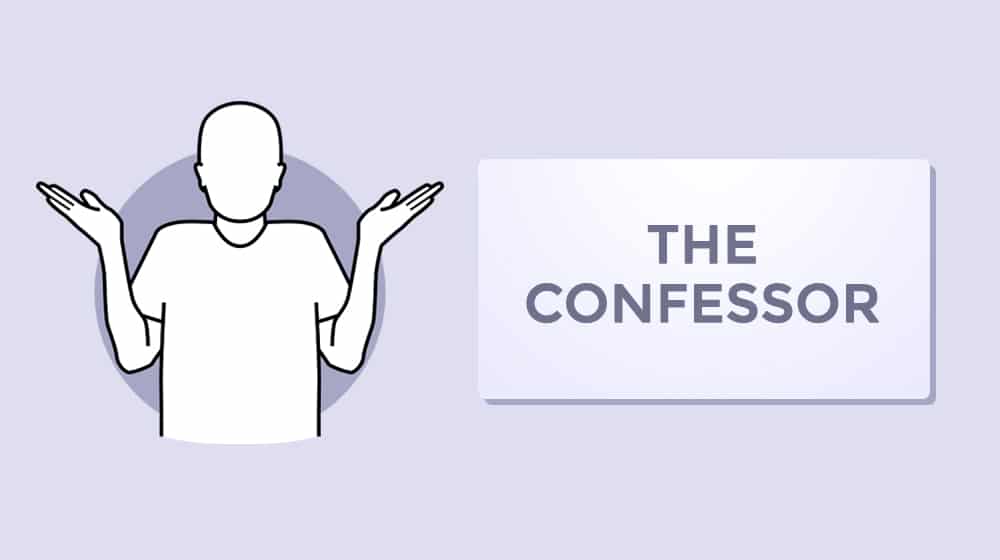
These are the people who are occasionally on the fringes of an industry, but more often, are just mainstream with their persona. They're very similar to Explainers and could be considered a spinoff.
What do they do? Well, they present themselves as revealing the truth the Industry or The Man doesn't want you to know. The Confessor generally takes three forms.
- They are framing legitimate knowledge. A blogger who claims to know how to hack the blogging industry and who can teach you the secrets will still give good, honest information, just couched in a way that seems edgy or counter-culture, and makes it more attractive to certain people.
- Fringe knowledge. These people are often considered gray-hat or even black-hat. They present their knowledge as a secret that the authorities want to suppress. Usually, it's a combination of honest advice, advice that is no longer relevant or is vaguely scummy (like black hat techniques for SEO), or, in rare cases, information that is being suppressed.
- Outsider scammers. "The secret They don't want you to know" is often the domain of grifters looking for easy, unsuspecting marks. Unfortunately, a lot of health and finance frauds use this framework.
This style can be a compelling persona for blogging, but it also risks attracting true believers in things you might not want to propagate.
5: The Replier
The Replier is the person who doesn't have the resources to be on the front lines or the cutting edge. So, rather than fight to pretend they are, they take a step back and wait. Their content is always framed to respond to something else, like a trend or a significant post. Usually, they flip it on its head and write the inverse.
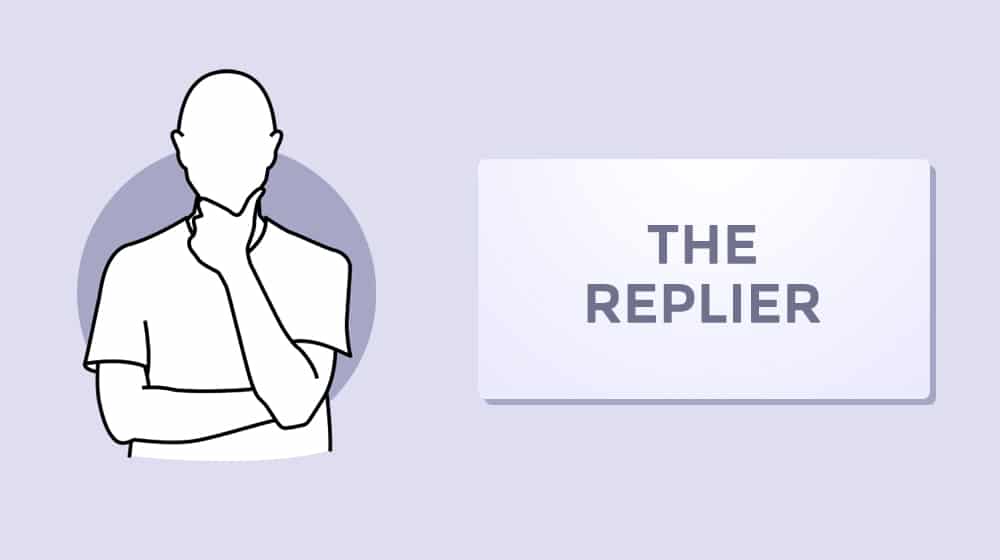
Often, these bloggers don't have much innovation to add. They might find fringe counter-examples, but they often don't provide any backup for their points and are simply being contrarian for the sake of being contrarian.
Other times, they might write the same information, framed differently. If someone writes a "Top Ten SEO Techniques You Have to Use," they might take each tip and insert it into "Ten SEO Mistakes You Can't Afford to Make," where all of the information is the same, just framed in the inverse.
The unfortunate truth of these bloggers is that they often don't have anything original to add to a discussion. Some of them are fine, but many come off as needlessly contrarian and combative, which makes them prone to being ostracized from some blogging communities. It's a formidable persona to maintain while still providing value to an audience and not slipping into the worst parts of the Confessor.
6: The Aggregator
The Aggregator is the person who is not themselves an authority, but who positions themselves as the information broker. They might not know the ins and outs of a topic, but they know who to talk to, and they have the connections to get it done.

Often, these people accumulate content from other places and either reframe it as their own or, more often, serve as a platform for another authority. They create roundup posts, build up libraries of quotes, and publish weekly lists of "the best content in the niche this week."
These people themselves are often ignorable or forgettable, but their blogs are great because they can take the place of reading a dozen or more other blogs regularly. They're good places to keep an eye on so you can be aware of emerging trends and topics, in any case.
7: The Instructor
The Instructor is another archetype that is similar to the explainer. However, unlike the explainer, they are focused more on teaching you how to do something rather than just explaining the concept behind it. I do it sometimes, but I don't consider it my primary blogging persona.
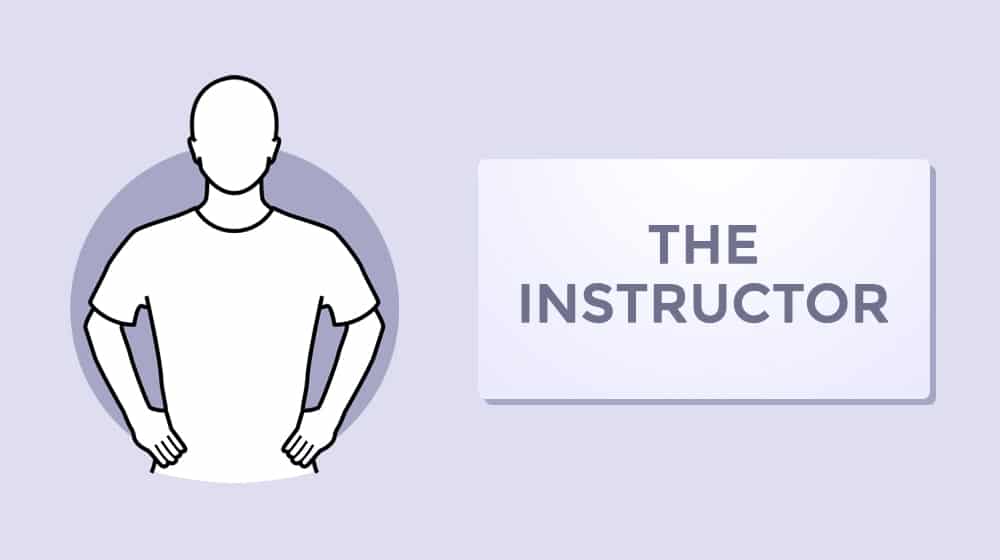
These are sites generally full of tutorials and guides. The content is less about understanding or education and more about a step-by-step process a user can follow to solve a problem. It's laser-targeted to solve a particular kind of problem for a specific type of audience.
Often, you see these kinds of content on business blogs. It takes two forms. The first is obvious. "You have a problem with X. Here's how to use our product to solve it." The second is a little more counter-intuitive. It's just a solution on how to solve the problem without using its product.
The second one works in two ways. First, it builds authority and reliability for the brand. "We know what we're talking about, and we'll teach you." The second is by making the barrier to DIY while lowering entry barriers for their product. "Here's how to do it. It's a lot of work, right? What if you could streamline it all by using our product?" It works pretty well because companies have realized that their tutorial will drive away people who weren't going to buy a solution anyway but might attract those on the fence.
8: The Influencer
The Influencer is very similar to the narrator. The difference is, where the narrator talks about their story (where they're going and where they've been), the Influencer talks about who and where they are.

Influencers usually thrive on some combination of prestige, lifestyle, and appearance. These are the people whose fame seems inexplicable as if they're famous for being famous. They make their money through brand deals and affiliate recommendations because being associated with their prestige somehow benefits people.
This kind of content creator is much less common amongst bloggers than on social media like YouTube or Instagram. However, it can still show up occasionally, usually in a blogger who maintains that kind of visible presence.
9: The Trend Chaser
Trend Chasers are responsible for creating the cutting-edge content and news that so many other blogger archetypes rely on. They're the ones doing reporting on industry trends, following Reddit threads and Twitter hashtags, and generating the time-sensitive content that spurs on the entire blogging industry.

Every post that picks up a trend or a news report and writes a longer expose or analysis owes its existence to the trend chasers. Yet, at the same time, the trend chasers can be an almost spam-like group of bloggers. They constantly cannibalize from one another, such that posts appear within minutes of one another, only a few hundred words to say the same thing over and over across hundreds or thousands of websites.
10: The Clickbaiter
This last blogger, well, you know the type. These are the people who make content that you won't believe. You have to click on it to find out more, but more importantly, when they get you hooked, either there's no natural substance to be had, or there's nothing behind the curtain.
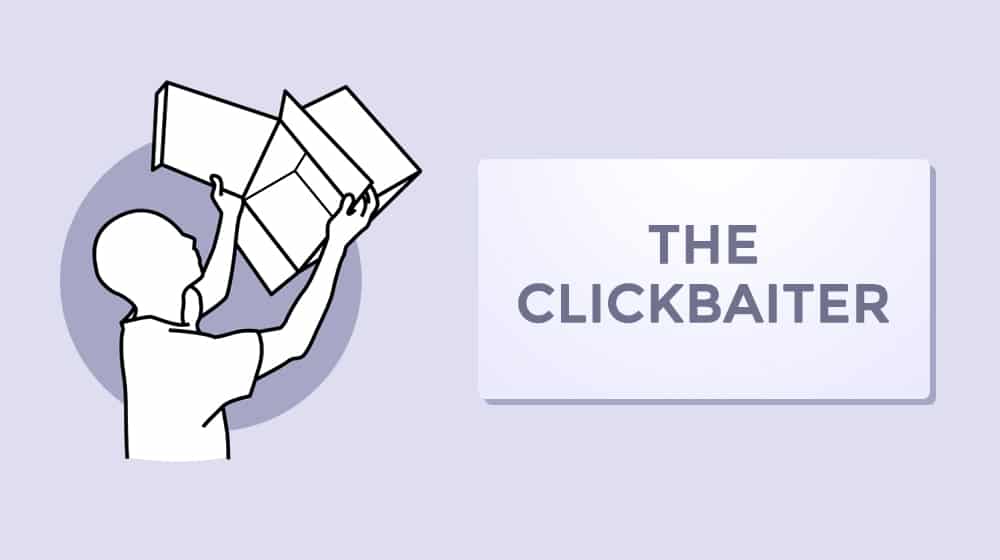
They'll often use paywall functionality to require that you sign up for their email marketing to read it. Luckily, this blogging personality is a dying breed.
Which persona are you? Let me know in the comments. Maybe I'll even make a quiz for you to take! Let me know if you think that would be fun.










February 14, 2022
I think I'm more of a narrator but I'm striving to become a bit more of an explainer. I think being an explainer is much better in the long run but I do think retaining a bit of my narrative flair can help, too. Anyway, this is certainly a fun and informative read
February 21, 2022
Thanks, Charli!
I think I'm a combination of an explainer (60%), confessor (10%), and instructor (30%).
I've been digging into more detailed step-by-step guides and walkthroughs lately, so maybe I'm trending more towards an instructor/explainer hybrid.